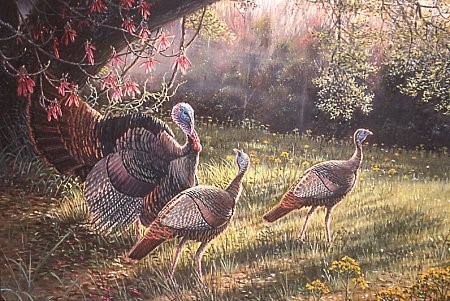Deep Woods with Thomas Moore: Turkey Woods

April 10, 2016
As I loaded the decoys into the back of the truck, I had high hopes for the morning’s success. There was a light rain as we drove down Highway 64. It was colder than most April mornings, being that it was 49 degrees Fahrenheit. While smearing brown and black paint on my face, I wondered how the birds would react to this atypical weather. We slowed as we got to where the pavement meets the dirt.
I reminded my father to turn off the lights to the truck to keep from spooking the roosted gobblers. When I stepped into the brisk air, I was very unsure of how the hunt would go down. My little brother was very eager to get in the blind, but he walked with silence. The walk was only half a mile, so we were setting out the decoys in no time. I could feel the rain drops hitting my hand while I drove the decoy stake into the ground. My heart started to race because I had finally realized that this was the beginning of everything. This hunt would determine the whole season. I slowly crept into the Ameristep ground blind, being as quiet as possible. My little brother chambered a 3” turkey load and put two more in the magazine. We sat in silence as wind howled by the blind. It was still pretty dark at this point in the hunt. Will, my brother, was very excited for what the morning had to offer. As the sun skirted the horizon I knew that now was when things would come alive. Our hopes began to dwindle as the woods were quiet as a mouse. We remained patient and thought that maybe the mid-morning would bring the birds out of the hardwoods. Around an hour after sunrise, I heard a distant yelp. “Did you hear that?” I asked Will. He nodded while slowly moving his shotgun to a more ready position. The hen yelped one more time, but then shut up. I was nervous because if the hunt continued this way, we would walk out empty handed. We waited another 30 minutes until suddenly we heard a turkey right behind us. I grabbed Will and mouthed the words “Get ready”. The turkey chirped and this time it was even closer. I was aware that it was probably a hen, but the best turkey decoy is a real one. If we could get this hen into shooting range, there was a chance that a gobbler would be following her or once she got to us a gobbler would come to her. I hit my box call to let her know our exact location. All of the sudden the hen was silent, and our excitement was gone with the hen. I gave it 15 minutes to see if the bird would appear or yelp, but it did not. Will was getting antsy to either shoot or to try a different tactic. Finally I whispered to him “It’s time to go to the turkeys if they won’t come to us”. We snuck out of the blind and headed for the river. Our blind is set up at the edge of a field where the field meets a path to the forest and river. We went straight down the path, pacing ourselves and stopping to call every so often. We came to an intersection where a lane met the path. I sat the decoy down and pulled out my slate call. I pulled my striker across the glass, causing a nice loud yelp. Will and I listened for a response, but there wasn’t one to be heard. We kept on trekking to the river. When we finally got to the river, there was only flowing water and clouds in the sky. Turkeys: no, better than sleeping in: yes.
The moral of the story is that windy, rainy, and cold days don’t make for the best turkey hunting weather. Warmer weather may be unpleasant to the turkey hunter, but the turkeys can be more reliable. Very few youth hunters in Eastern North Carolina bagged a bird on Saturday, compared to past years. This doesn’t mean that it was not worth hunting because that trophy gobbler could walk out at any time. You also don’t remember the best day of sleeping in, but a morning spent with friends and family is not soon forgotten. Hopefully, youth season does not predict the rest of the season because if so, we might be in trouble. Good luck to everyone going afield this season.
